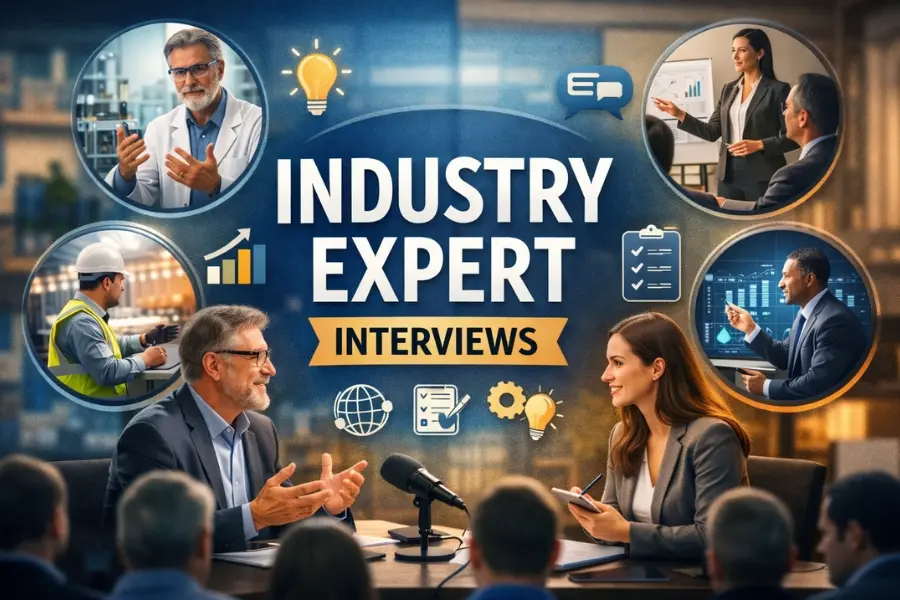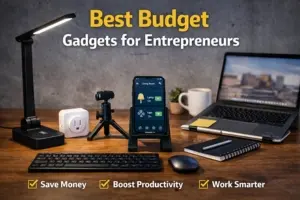How to Leverage Expert Interviews for Business and Research
Updated: 28 Jan 2026
An expert interview is a structured conversation with a specialist in a specific field. These professionals share valuable insights, experiences, and expert advice, making complex topics easier to understand.

These interviews are helpful for businesses to stay ahead of industry trends, researchers to gather reliable information, and professionals to improve their knowledge and skills. Speaking with experts helps make informed decisions, discover new opportunities, and avoid common mistakes in any field.
What are Industry Expert Interviews?
Industry Expert Interviews are in-depth conversations with professionals who have extensive knowledge and experience in a specific field. These interviews are used to gather practical insights, real-world perspectives, and expert opinions that go beyond general information. They help readers understand industry trends, challenges, and best practices directly from those working at the top level.
One of the key benefits of industry expert interviews is credibility. When insights come from recognized professionals, the content becomes more trustworthy and authoritative. This makes such interviews especially valuable for businesses, researchers, and content creators who want to build confidence with their audience.
Industry expert interviews also provide unique and actionable knowledge. Experts often share lessons learned from personal experience, success stories, and even failures. These insights can help others make better decisions, avoid common mistakes, and stay competitive in a rapidly changing market.

Overall, industry expert interviews serve as a bridge between theory and practice. They humanize complex topics by presenting them through authentic voices and real experiences, making information more engaging, relatable, and valuable for readers and professionals alike.
What Does an Industry Expert Do?
An industry expert is a highly skilled professional with deep knowledge and experience in a particular field. Their role includes:
- Providing insights to help others understand industry trends and challenges.
- Solving problems by offering expert advice and practical solutions.
- Predicting trends based on experience and market analysis.
- Giving recommendations to businesses, researchers, and professionals to improve decision-making.
Their expertise helps industries grow, adapt to changes, and stay competitive.
What is an Industry Interview?
An industry interview is a conversation with an expert to collect valuable information about a specific industry. It is commonly used for:
- Research – To gain in-depth knowledge from experienced professionals.
- Journalism – To provide accurate and expert-backed insights in articles and reports.
- Business Strategy – To understand market trends and make informed decisions.
- Content Creation – To produce high-quality, expert-driven content for blogs, podcasts, and videos.
Industry interviews help uncover new trends, challenges, and opportunities, making them essential for professionals across different fields.
8 CEO interview tips for C-Suite executive jobs
What to Ask an Industry Expert?
When interviewing an industry expert, ask insightful questions to gain valuable knowledge. Here are some key questions to consider:
- What trends do you see shaping the industry? – Helps understand future developments.
- What challenges do professionals in this field face? – Reveals obstacles and how to overcome them.
- What advice would you give to someone new in the industry? – Guides beginners.
- How has the industry evolved over the years? – Shows changes and improvements in the field.
- What are the common mistakes businesses make in this industry? – Helps avoid pitfalls and improve decision-making.
Asking the right questions ensures you gather practical insights and expert recommendations that can benefit businesses, researchers, and professionals.
How to Be an Expert Interviewer?
Conducting an excellent expert interview requires preparation, engagement, and effective communication. Follow these steps to make your interviews successful:
- Research the Expert – Learn about their background, achievements, and expertise to ask relevant questions.
- Prepare Thoughtful Questions – Focus on key industry topics and avoid generic or repetitive questions.
- Create a Comfortable Environment – Make the expert feel comfortable for a smooth and engaging conversation.
- Listen Actively – Pay close attention and ask follow-up questions based on their responses.
- Summarize Key Takeaways – After the interview, highlight the most valuable insights for your audience.
A well-conducted interview provides valuable knowledge, builds credibility, and fosters meaningful discussions.
How to Conduct Expert Interviews
A successful expert interview requires planning and engagement. Follow these steps to make the most of your conversation:
- Identify the Right Expert: Choose someone with credible experience and industry knowledge.
- Schedule and Prepare: Arrange a suitable time and gather essential tools, such as a notebook, recorder, or video conferencing software.
- Establish a Structure: Start with an introduction, proceed with the main questions, and end with a summary of key points.
- Engage in Meaningful Discussion: Encourage the expert to share deep insights, allowing for a natural and insightful conversation.
- Follow Up and Share Findings: Send a thank-you note and publish or share the valuable insights gathered.
These steps ensure an informative, engaging, and beneficial interview for the interviewer and the audience.
Understanding the Importance of Expert Interviews
Expert interviews provide first-hand knowledge, validate ideas, and offer unique insights that may not be available in traditional research sources. They are especially valuable in:
- Business Strategy Development – Helps companies make informed decisions and stay ahead of competitors.
- Market Research – Provides real-world insights into industry trends and customer behavior.
- Thought Leadership Content Creation – Enhances credibility by featuring expert opinions in blogs, articles, and reports.
- Academic and Qualitative Research – Offers deep analysis and expert-backed data for studies and publications.
By interviewing experts, businesses, and researchers, we gain reliable, up-to-date, and actionable information to improve strategies and decision-making.
Best Practices for Conducting Expert Interviews
To ensure a smooth and productive expert interview, follow these best practices:
- Be Respectful of Time – Stick to the agreed duration and keep the conversation focused.
- Ask Open-Ended Questions – Encourage detailed responses instead of simple yes/no answers.
- Take Notes or Record (with Permission) – Capture insights accurately for later reference.
- Follow Up with a Summary – Share a recap of key points with the expert to ensure accuracy.
Following these steps can create an engaging, insightful, and professional interview experience.
Challenges in Conducting Expert Interviews
Expert interviews can be highly valuable, but they also come with challenges. Here are some common difficulties and how to handle them:
- Finding the Right Expert: Identifying and contacting a qualified professional can be time-consuming, but research and networking can help find the best fit.
- Scheduling Conflicts: Experts have busy schedules, so flexibility and early planning are key to securing an interview.
- Keeping the Conversation Focused: Some discussions may go off-topic, so the interviewer should gently steer the conversation back to key points.
- Ensuring Clear Communication: Industry jargon can be confusing, so asking for simplified explanations is essential.
By anticipating these challenges, you can conduct effective and insightful expert interviews.
How to Effectively Conduct an Expert Interview
To get the most value from an expert interview, follow these key steps:
- Start with a Strong Introduction – Clearly explain the purpose of the interview and what insights you hope to gain.
- Use a Mix of General and Specific Questions – Ask broad industry questions to understand trends, followed by detailed questions for in-depth insights.
- Encourage Storytelling – Real-life examples and experiences make the conversation more engaging and relatable.
- Summarize Key Points at the End – Recap the main takeaways to ensure clarity and reinforce the most critical insights.
A well-structured interview keeps the discussion focused, informative, and impactful for the expert and the audience.
Benefits of Subject Matter Expert Interviews in Qualitative Research
Expert interviews are crucial in qualitative research, offering insights beyond traditional methods. Key benefits include:
- Deep Insights – Experts share detailed knowledge that standard research methods may overlook.
- Real-World Applications – The information gathered can be directly applied in business strategies and research projects.
- Enhanced Credibility – Expert opinions add authenticity and authority, making studies more trustworthy.
- Future Trend Predictions – Experts provide foresight into upcoming industry changes and innovations.
By incorporating expert interviews into research, professionals gain valuable, practical, and forward-thinking insights that strengthen their work.
How to Conduct a Subject Matter Expert Interview
A well-planned subject matter expert (SME) interview ensures you gain valuable insights. Follow these steps for an effective interview:
- Define the Purpose – Clearly outline what you want to achieve from the interview.
- Choose the Right Expert – Select a professional with relevant expertise.
- Prepare a Structured Questionnaire – Use a mix of open-ended and specific questions to gather detailed insights.
- Create a Comfortable Setting – Ensure a relaxed and professional environment for a smooth conversation.
- Document and Analyze Responses – Take notes or record (with permission) to extract key insights and identify patterns.
Following these steps helps conduct insightful and productive expert interviews, leading to meaningful research outcomes.
The Expert Interview Plan
A good interview plan helps keep the process organized and focused. Here’s what a typical plan includes:
- Goals and Objectives
Define what you want to learn from the interview. Clearly state your information needs. - Target Expert Profile
Choose the right expert by identifying who has the experience and skills needed for your topic. - Question Framework
Outline the key areas and topics you want to cover. This helps you create a list of essential questions. - Logistics and Setup
Decide how the interview will be conducted. Will it be in person, over the phone, or via video? Plan the technical and practical details.
This structured plan ensures that you conduct a smooth and productive expert interview.
The Expert Interview Plan in Action
Once your interview plan is ready, follow these steps to execute it effectively:
- Outreach and Scheduling – Contact the expert, explain the purpose, and schedule an interview.
- Pre-Interview Research – Learn about the expert’s background, achievements, and expertise to ask relevant questions.
- Interview Execution – Conduct the discussion, focus on key topics, and allow for meaningful insights.
- Post-Interview Review – Analyze responses, extract key findings, and organize the information for further use.
These steps ensure a well-structured, insightful, and professional expert interview process.
Creating an Expert Interview Guide
An interview guide helps structure the conversation for a smooth and productive discussion. Here’s what a well-prepared guide should include:
- Introduction Section – Start by briefing the expert on the purpose of the interview and what you aim to achieve.
- Core Questions – Prepare a mix of open-ended and specific industry-related questions to gain valuable insights.
- Follow-Up Prompts – Encourage deeper discussions by asking follow-up questions based on the expert’s responses.
- Conclusion and Thank You – Summarize key insights, highlight essential takeaways, and express gratitude for their time.
A well-structured guide ensures the interview stays focused, insightful, and engaging for both parties.
Real-Life Examples of Expert Interviews
- Apple’s Executive Interviews: Apple frequently interviews its key executives to share insights on product innovations and industry trends.
- Forbes’ Industry Expert Features: Forbes regularly publishes expert interviews to provide insights into various industries.
- Harvard Business Review (HBR) Expert Discussions: HBR includes interviews with leading experts who discuss business strategies and leadership skills.
Sample Expert Interview Template
Introduction
- Briefly introduce yourself and explain the purpose of the interview.
- Share how the insights will be used (e.g., research, business strategy, content creation).
Core Questions
- What inspired you to work in this industry?
- What are the most prominent challenges professionals face today?
- Can you share a success story from your experience?
Follow-Up Questions
- How do you see this industry evolving in the next five years?
- What advice would you give to aspiring professionals in this field?
Conclusion
- Summarize the key insights shared during the conversation.
- Thank the expert for their time and valuable input.
Final Thoughts
Expert interviews are powerful tools for gaining in-depth industry knowledge. Proper planning, well-structured questions, and effective communication can provide valuable insights that drive business growth, academic research, and industry innovation.
- For bold: [b]text[/b]
- For italic: [i]text[/i]
- For underline: [u]text[/u]






